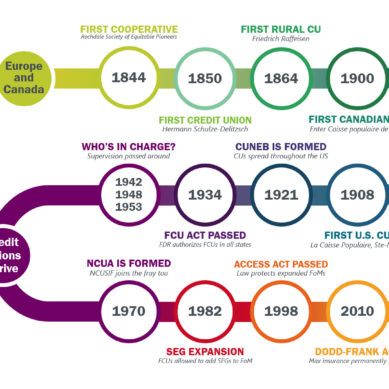Picture this: an attractive smiling face paired with a story about how your credit union helped your member. At the surface, it may seem like something nice to have, but easy to drop when the focus shifts to pressing issues, such as interest rates and deposits.
But in a volatile environment, these member stories are more important than ever before. Used correctly, they can serve as powerful psychological tools to increase your conversion rates and lead to new members.
Here are two scientifically proven reasons why they work.
The power of characters
When processing information, scientists have found the human brain relates best to narrative storytelling, particularly when it involves characters. Our brains focus on the thoughts and feelings of the character, whether the story is told visually or through spoken or written words. When a person sees or hears a story, the neurons in their brain fire in a similar way to the teller’s, creating a phenomenon called “mirroring.” If a person feels something emotionally when hearing the story, their brain releases dopamine, which makes it much more likely that they will remember the details.
“Stories are remembered up to 22 times more than facts alone,” Dr. Jennifer Aker, a professor at Stanford University, said.
According to author Will Storr in The Science of Storytelling, a story starts with an unexpected change or an information gap which invokes a sympathetic cortisol stress reaction in the listener. For a credit union testimonial, an unexpected change could be a car crash that totals someone’s car or an instance of fraudulent charges on someone’s checking account.
A compelling character facing these problems emotionally connects the reader to the story. Then, when your credit union provides the solution to those problems, the oxytocin released in the listener becomes associated with your brand.
Emotionally engaging stories also inspire action. An Iterable study found that 83% of people want to purchase from a brand they have formed an emotional connection with. It makes business sense to tell a good story, inspiring people to join your credit union.
Social proof
Imagine you are at a food festival, and you see two food trucks selling donuts. One has a line fifteen people deep, while the other has no line at all. Do you assume the one with no line must be no good, and the one with a long line must be worth the wait? Or do you immediately walk over to the truck with no line?
How you answered this question shows how susceptible you are to social proof. Robert Cialdini, a psychologist and leading expert in the science of persuasion, identified social proof as one of his six theories of persuasion. He found that in situations where people aren’t sure what to do, they look to others around them for guidance.
Cialdini writes, “Following the advice or behaviors of the majority of those around us is often seen as a shortcut to good decision-making.”
In the years since Cialdini premiered his principles, scientists have backed up his ideas through neurology. Studies have found subconscious mechanisms by which our brains are constantly evaluating how well our opinions and actions match those around us. When a mismatch is detected, it activates specific brain functionality to determine if a change in attitude or behavior is needed. These comparison processes form the basis of how we think about others.
Member testimonials can be used to activate social proof. Seeing member testimonials can influence someone researching a credit union to feel that it is the best choice. It also reinforces in existing members the belief that they made the right decision.
People are also most likely to follow the actions of those they perceive to be most like them. This can be used to your advantage in member testimonials. For example, college students would be likely to respond to a story showing why a fellow college student chose your credit union. Other potential members looking to buy their first house could be persuaded by a story of how the credit union helped an individual make this goal a reality. By targeting member testimonials to those most like the featured member, you can get the most benefit from your social proof.
Use science to grow your membership
The effectiveness of customer testimonials is grounded in the principles of human psychology. By providing tangible, relatable experiences from real members, testimonials can build trust, alleviate doubts, and influence decision-making in a way that no amount of traditional advertising can.
As consumers continue to seek authenticity and validation in their purchasing choices, incorporating genuine testimonials into your marketing strategy is not just a good idea—it’s a necessity. By understanding and leveraging the science behind these endorsements, credit unions can create stronger connections with their audience and ultimately drive greater success.

























































